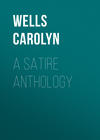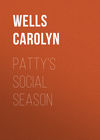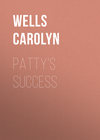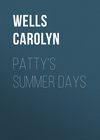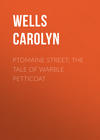Kitabı oku: «A Satire Anthology», sayfa 14
Yazı tipi:
AN ADVANCED THINKER
THIS modern scientist – a word uncouth —
Who calls himself a seeker after truth,
And traces man through monkey back to frog,
Seeing a Plato in each pollywog,
Ascribes all things unto the power of Matter.
The woman’s anguish, and the baby’s chatter —
The soldier’s glory, and his country’s need —
Self-sacrificing love – self-seeking greed —
The false religion some vain bigots prize,
Which seeks to win a soul by telling lies —
And even pseudo-scientific clatter —
All these, he says, are but the work of Matter.
Thus, self-made science, like a self-made man,
Deems naught uncomprehended in its plan;
Sees naught he can’t explain by his own laws.
The time has come, at length, to bid him pause,
Before he strive to leap the unknown chasm
Reft wide ’twixt awful God and protoplasm.
Brander Matthews.
A THOUGHT
IF all the harm that women have done
Were put in a bundle and rolled into one,
Earth would not hold it,
The sky could not enfold it,
It could not be lighted nor warmed by the sun;
Such masses of evil
Would puzzle the devil,
And keep him in fuel while Time’s wheels run.
But if all the harm that’s been done by men
Were doubled, and doubled, and doubled again,
And melted and fused into vapour, and then
Were squared and raised to the power of ten,
There wouldn’t be nearly enough, not near,
To keep a small girl for the tenth of a year.
J. K. Stephen.
A SONNET
TWO voices are there: one is of the deep;
It learns the storm-cloud’s thunderous melody,
Now roars, now murmurs with the changing sea,
Now bird-like pipes, now closes soft in sleep:
And one is of an old, half-witted sheep,
Which bleats articulate monotony,
And indicates that two and one are three,
That grass is green, lakes damp, and mountains steep;
And, Wordsworth, both are thine. At certain times
Forth from the heart of thy melodious rhymes,
The form and pressure of high thoughts will burst;
At other times – good Lord! I’d rather be
Quite unacquainted with the A B C,
Than write such hopeless rubbish as thy worst.
J. K. Stephen.
THEY SAID
BECAUSE thy prayer hath never fed
Dark Atë with the food she craves;
Because thou dost not hate, they said,
Nor joy to step on foemen’s graves;
Because thou canst not hate, as we,
How poor a creature thou must be!
Thy veins as pale as ours are red!
Go to! Love loves thee not, they said.
Because by thee no snare was spread
To baffle Love – if Love should stray;
Because thou dost not watch, they said,
To strictly compass Love each way;
Because thou dost not watch, as we,
Nor jealous Care hath lodged with thee,
To strew with thorns a restless bed —
Go to! Love loves thee not, they said.
Because thy feet were not misled
To jocund ground, yet all infirm;
Because thou art not fond, they said,
Nor dost exact thine heyday term;
Because thou art not fond, as we,
How dull a creature thou must be!
Thy pulse how slow, yet shrewd thy head!
Go to! Love loves thee not, they said.
Because thou hast not roved to wed
With those to Love averse or strange;
Because thou hast not roved, they said,
Nor ever studied artful change;
Because thou hast not roved, as we,
Love paid no ransom rich for thee,
Nor, seeking thee, unwearied sped.
Go to! Love loves thee not, they said.
Aye, so! because thou thought’st to tread
Love’s ways, and all his bidding do;
Because thou hast not tired, they said,
Nor ever wert to Love untrue;
Because thou hast not tired, as we,
How tedious must thy service be;
Love with thy zeal is surfeited!
Go to! Love loves thee not, they said.
Because thou hast not wanton shed
On every hand thy heritage;
Because thou art not flush, they said,
But hast regard to meagre age;
Because thou art not flush, as we,
How strait thy cautious soul must be!
How well thy thrift stands thee in stead!
Go to! Love loves thee not, they said.
And therefore look thou not for bread —
For wine and bread from Love’s deep store,
Because thou hast no need, they said;
But us he’ll feast forevermore!
Because thou hast no need, as we,
Sit in his purlieus, thou, and see
How with Love’s bounty we are fed.
Go to! Love loves thee not, they said.
Edith M. Thomas.
TO R. K
As long I dwell on some stupendous
And tremendous (Heaven defend us!)
Monstr’inform’-ingens-horrendous
Demoniaco-seraphic
Penman’s latest piece of graphic. —Browning.
WILL there never come a season
Which shall rid us from the curse
Of a prose which knows no reason,
And an unmelodious verse? —
When the world shall cease to wonder
At the genius of an Ass,
And a boy’s eccentric blunder
Shall not bring success to pass? —
When mankind shall be delivered
From the clash of magazines,
And the inkstand shall be shivered
Into countless smithereens? —
When there stands a muzzled stripling,
Mute, beside a muzzled bore? —
When the Rudyards cease from Kipling,
And the Haggards Ride no more?
J. K. Stephen.
TO MIGUEL DE CERVANTES SAAVEDRA
A BLUEBIRD lives in yonder tree,
Likewise a little chickadee,
In two woodpeckers’ nests, rent free.
There, where the weeping willow weeps,
A dainty house-wren sweetly cheeps;
From an old oriole’s nest she peeps.
I see the English sparrow tilt
Upon a limb with sun begilt;
Her nest an ancient swallow built.
So it was one of your old jests,
Eh, Mig. Cervantes, that attests
“There are no birds in last year’s nests?”
Richard Kendall Munkittrick.
WHAT’S IN A NAME?
IN letters large upon the frame,
That visitors might see,
The painter placed his humble name:
O’Callaghan McGee.
And from Beersheba unto Dan,
The critics, with a nod,
Exclaimed: “This painting Irishman
Adores his native sod.
“His stout heart’s patriotic flame
There’s naught on earth can quell;
He takes no wild romantic name
To make his pictures sell.”
Then poets praise, in sonnets neat,
His stroke so bold and free;
No parlor wall was thought complete
That hadn’t a McGee.
All patriots before McGee
Threw lavishly their gold;
His works in the Academy
Were very quickly sold.
His “Digging Clams at Barnegat,”
His “When the Morning Smiled,”
His “Seven Miles from Ararat,”
His “Portrait of a Child,”
Were purchased in a single day,
And lauded as divine.
…
That night as in his atelier
The artist sipped his wine,
And looked upon his gilded frames,
He grinned from ear to ear:
“They little think my real name’s
V. Stuyvesant De Vere!”
Richard Kendall Munkittrick.
WED
FOR these white arms about my neck —
For the dainty room, with its ordered grace —
For my snowy linen without a fleck —
For the tender charm of this uplift face —
For the softened light and the homelike air —
The low, luxurious cannel fire —
The padded ease of my chosen chair —
The devoted love that discounts desire —
I sometimes think, when twelve is struck
By the clock on the mantel, tinkling clear,
I would take – and thank the gods for the luck —
One single hour with the boys and the beer,
Where the sawdust-scent of a cheap saloon
Is mingled with malt; where each man smokes;
Where they sing the street-songs out of tune,
Talk Art, and bandy ephemeral jokes.
By Jove, I do! And all the time
I know not a man that is there to-night,
But would barter his brains to be where I’m —
And I’m well aware that the beggars are right.
H. C. Bunner.
ATLANTIC CITY
O CITY that is not a city, unworthy the prefix Atlantic,
Forlornest of watering-places, and thoroughly Philadelphian!
In thy despite I sing, with a bitter and deep detestation —
A detestation born of a direful and dinnerless evening,
Spent in thy precincts unhallowed – an evening, I trust, may recur not.
Never till then did I know what was meant by the word God-forsaken:
Thou its betokening hast taught me, being the chiefest example.
Thou art the scorned of the gods; thy sand from their sandals is shaken;
Thee have they left in their wrath to thy uninteresting extensiveness,
Barren, and bleak, and big; a wild aggregation of barracks,
Miscalled hotels, and of dovecotes denominate cottages;
A confusion of ugly girls, of sand, and of health-bearing breezes,
With one unending plank-walk for a true Philadelphia “attraction.”
City ambitiously named, why, with inducements delusive,
Is the un-Philadelphian stranger lured to thy desert pretentious?
’Tis not alone that thy avenues, broad and unpaved and unending,
Reecho yet with the obsolete music of “Pinafore,”
Whistled in various keys by the rather too numerous negro;
’Tis not alone that Propriety – Propriety too Philadelphian —
Over thee stretches an ægis of wholly superfluous virtue;
That thou art utterly good; hast no single vice to redeem thee;
’Tis not alone that thou art provincial in all things, and petty;
And that the dulness of death is gay, compared to thy dulness —
’Tis not alone for these things that my curse is to rest upon thee,
But for a sin that crowns thee with perfect and eminent badness,
Sets thee alone in thy shame, the unworthiest town on the sea-coast;
This: That thou dinest at noon, and then in a manner barbarian,
Soupless, and wineless, and coffeeless, untimely and wholly indecent,
As is the custom, I learn, in Philadelphia proper.
I rose, and I fled from thy supper. I said, “I will get me a dinner!”
Vainly I wandered thy streets. Thy eating-places ungodly
Knew not the holiness of dinner. In all that evening I dined not;
But in a strange, low lair, infested of native mechanics,
Bolted a fried beefsteak for the physical need of my stomach.
And for them that have fried that steak, in Aïdes’ lowest back-kitchen,
May they eternally broil, by way of a warning to others.
During my wanderings, I met and hailed with delight one Italian,
A man with a name from “Pasquale” – the chap sung by Tagliapietra;
He knew what it was to dine; he comprehended my yearnings;
But the spell was also on him, the somnolent spell Philadelphian,
And his hostelry would not be open till Saturday next; and I cursed him.
Now this is not too much to ask – God knows! – that a mortal should want a
Pint of Bordeaux to his dinner, and a small cigarette for a climax;
But these things being denied him, where, then, is your civilization?
O Coney Island! of old I have reviled and blasphemed thee,
For that thou dousest thy glim at an hour that is unmetropolitan;
That thy frequenters’ feet turn townwards ere striketh eleven,
When the returning cars are filled with young men and maidens,
Most of the maidens asleep on the young men’s cindery shoulders —
Yea, but I spake as a fool, insensate, disgruntled, ungrateful:
Thee will I worship henceforth in appreciative humility;
Luxurious and splendid and urban, glorious and gaslit and gracious,
Gathering from every land thy gay and ephemeral tenantry,
From the Greek who hails thee “Thalatta!” to the rustic who murmurs “My golly!”
From the Bowery youth who requests his sweetheart to “Look at them billers!”
To the Gaul whom thy laughing waves almost persuade to immersion.
O Coney Island, thou art the weary citizen’s heaven —
A heaven to dine, not die in, joyful and restful and clamful.
Better one hour of thee than an age of Atlantic City!
H. C. Bunner.
THE FONT IN THE FOREST
THERE’S a prim little pond
At the back of Beyond,
And its waters are over your ears;
It’s a sort of a tarn
Behind Robin Hood’s barn,
Where the fish live a million years.
And the mortals who drink
At its pebbly brink
Are immediately changed into mullets,
Whose heads grow immense
At their bodies’ expense,
And whose eyes become bulbous as bullets.
But they willingly stay
Who have once found the way,
And they crave neither credit nor blame;
For to wiggle their tails,
And to practise their scales,
Is enough in the Fountain of Fame.
Herman Knickerbocker Vielé.
THE ORIGIN OF SIN
HE talked about the origin
Of sin;
But present sin, I must confess,
He never tried to render less;
But used to add, so people talk,
His share unto the general stock —
But grieved about the origin
Of sin.
He mourned about the origin
Of sin;
But never struggled very long
To rout contemporaneous wrong,
And never lost his sleep, they say,
About the evils of to-day —
But wept about the origin
Of sin.
He sighed about the origin
Of sin;
But showed no fear you could detect
About its ultimate effect;
He deemed it best to use no force,
But let it run its natural course —
But moaned about the origin
Of sin.
Samuel Walter Foss.
A PHILOSOPHER
ZACK BUMSTEAD useter flosserfize
About the ocean an’ the skies;
An’ gab an’ gas f’um morn till noon
About the other side the moon;
An’ ’bout the natur of the place
Ten miles beyend the end of space.
An’ if his wife she’d ask the crank
Ef he wouldn’t kinder try to yank
Hisself out-doors an’ git some wood
To make her kitchen fire good,
So she c’d bake her beans an’ pies,
He’d say, “I’ve gotter flosserfize.”
An’ then he’d set an’ flosserfize
About the natur an’ the size
Of angels’ wings, an’ think, and gawp,
An’ wonder how they make ’em flop.
He’d calkerlate how long a skid
’Twould take to move the sun, he did;
An’ if the skid was strong an’ prime,
It couldn’t be moved to supper-time.
An’ w’en his wife ’d ask the lout
Ef he wouldn’t kinder waltz about
An’ take a rag an’ shoo the flies,
He’d say, “I’ve gotter flosserfize.”
An’ then he’d set an’ flosserfize
’Bout schemes for fencing in the skies,
Then lettin’ out the lots to rent,
So’s he could make an honest cent.
An’ if he’d find it pooty tough
To borry cash fer fencin’-stuff?
An’ if ’twere best to take his wealth
An’ go to Europe for his health,
Or save his cash till he’d enough
To buy some more of fencin’-stuff;
Then, ef his wife she’d ask the gump
Ef he wouldn’t kinder try to hump
Hisself to t’other side the door,
So she c’d come an’ sweep the floor,
He’d look at her with mournful eyes,
An’ say, “I’ve gotter flosserfize.”
An’ so he’d set an’ flosserfize
’Bout what it wuz held up the skies,
An’ how God made this earthly ball
Jest simply out er nawthin’ ’tall,
An’ ’bout the natur, shape, an’ form
Of nawthin’ that he made it from.
Then, ef his wife sh’d ask the freak
Ef he wouldn’t kinder try to sneak
Out to the barn an’ find some aigs,
He’d never move, nor lift his laigs;
He’d never stir, nor try to rise,
But say, “I’ve gotter flosserfize.”
An’ so he’d set an’ flosserfize
About the earth, an’ sea, an’ skies,
An’ scratch his head, an’ ask the cause
Of w’at there wuz before time wuz,
An’ w’at the universe ’d do
Bimeby w’en time hed all got through;
An’ jest how fur we’d have to climb
Ef we sh’d travel out er time;
An’ ef we’d need, w’en we got there,
To keep our watches in repair.
Then, ef his wife she’d ask the gawk
Ef he wouldn’t kinder try to walk
To where she had the table spread,
An’ kinder git his stomach fed,
He’d leap for that ar kitchen door,
An’ say, “W’y didn’t you speak afore?”
An’ when he’d got his supper et,
He’d set, an’ set, an’ set, an’ set,
An’ fold his arms, an’ shet his eyes,
An’ set, an’ set, an’ flosserfize.
Samuel Walter Foss.
THE FATE OF PIOUS DAN
“RUN down and get the doctor – quick!”
Cried Jack Bean with a whoop;
“Run, Dan; for mercy’s sake, be quick!
Our baby’s got the croup.”
But Daniel shook his solemn head,
His sanctimonious brow,
And said: “I cannot go, for I
Must read my Bible now;
For I have regular hours to read
The Scripture for my spirit’s need.”
Said Silas Gove to Pious Dan,
“Our neighbour, ’Rastus Wright,
Is very sick; will you come down
And watch with him to-night?”
“He has my sympathy,” says Dan,
“And I would sure be there,
Did I not feel an inward call
To spend the night in prayer.
Some other man with Wright must stay;
Excuse me, while I go and pray.”
“Old Briggs has fallen in the pond!”
Cried little ’Bijah Brown;
“Run, Pious Dan, and help him out,
Or else he sure will drown!”
“I trust he’ll swim ashore,” said Dan,
“But now my soul is awed,
And I must meditate upon
The goodness of the Lord;
And nothing merely temporal ought
To interrupt my holy thought.”
So Daniel lived a pious life,
As Daniel understood,
But all his neighbours thought he was
Too pious to be good;
And Daniel died, and then his soul,
On wings of hope elate,
In glad expectancy flew up
To Peter’s golden gate.
“Now let your gate wide open fly;
Come, hasten, Peter! Here am I.”
“I’m sorry, Pious Dan,” said he,
“That time will not allow;
But you must wait a space, for I
Must read my Bible now.”
So Daniel waited long and long,
And Peter read all day.
“Now, Peter, let me in,” he cried.
Said Peter, “I must pray;
And no mean temporal affairs
Must ever interrupt my prayers.”
Then Satan, who was passing by,
Saw Dan’s poor shivering form,
And said, “My man, it’s cold out here;
Come down where it is warm.”
The angel baby of Jack Bean,
The angel ’Rastus Wright,
And old Briggs, a white angel, too,
All chuckled with delight;
And Satan said, “Come, Pious Dan,
For you are just my style of man.”
Samuel Walter Foss.
THE MEETING OF THE CLABBERHUSES
I
HE was the Chairman of the Guild
Of Early Pleiocene Patriarchs;
He was chief Mentor of the Lodge
Of the Oracular Oligarchs;
He was the Lord High Autocrat
And Vizier of the Sons of Light,
And Sultan and Grand Mandarin
Of the Millennial Men of Might.
He was Grand Totem and High Priest
Of the Independent Potentates;
Grand Mogul of the Galaxy
Of the Illustrious Stay-out-lates;
The President of the Dandydudes,
The Treasurer of the Sons of Glee;
The Leader of the Clubtown Band
And Architects of Melody.
II
She was Grand Worthy Prophetess
Of the Illustrious Maids of Mark;
Of Vestals of the Third Degree
She was Most Potent Matriarch;
She was High Priestess of the Shrine
Of Clubtown’s Culture Coterie,
And First Vice-President of the League
Of the Illustrious G. A. B.
She was the First Dame of the Club
For teaching Patagonians Greek,
She was Chief Clerk and Auditor
Of Clubtown’s Anti-Bachelor Clique;
She was High Treasurer of the Fund
For Borrioboolaghalians,
And the Fund for Sending Browning’s Poems
To Native-born Australians.
III
Once to a crowded social fête
Both these much-titled people came,
And each perceived, when introduced,
They had the self-same name.
Their hostess said, when first they met:
“Permit me now to introduce
My good friend Mr. Clabberhuse
To Mrs. Clabberhuse.”
“’Tis very strange,” said she to him,
“Such an unusual name! —
A name so very seldom heard,
That we should bear the same.”
“Indeed, ’tis wonderful,” said he,
“And I’m surprised the more,
Because I never heard the name
Outside my home before.
“But now I come to look at you,”
Said he, “upon my life,
If I am not indeed deceived,
You are – you are – my wife.”
She gazed into his searching face,
And seemed to look him through;
“Indeed,” said she, “it seems to me
You are my husband, too.
“I’ve been so busy with my clubs,
And in my various spheres,
I have not seen you now,” she said,
“For over fourteen years.”
“That’s just the way it’s been with me;
These clubs demand a sight” —
And then they both politely bowed,
And sweetly said “Good-night.”
Sam Walter Foss.
WEDDED BLISS
“O COME and be my mate!” said the Eagle to the Hen;
“I love to soar, but then
I want my mate to rest
Forever in the nest!”
Said the Hen, “I cannot fly,
I have no wish to try,
But I joy to see my mate careering through the sky!”
They wed, and cried, “Ah, this is Love, my own!”
And the Hen sat, the Eagle soared, alone.
“O come and be my mate!” said the Lion to the Sheep;
“My love for you is deep!
I slay – a Lion should,
But you are mild and good!”
Said the Sheep, “I do no ill —
Could not, had I the will;
But I joy to see my mate pursue, devour, and kill.”
They wed, and cried, “Ah, this is Love, my own!”
And the Sheep browsed, the Lion prowled, alone.
“O come and be my mate!” said the Salmon to the Clam;
“You are not wise, but I am.
I know sea and stream as well;
You know nothing but your shell.”
Said the Clam, “I’m slow of motion,
But my love is all devotion,
And I joy to have my mate traverse lake and stream and ocean!”
They wed, and cried, “Ah, this is Love, my own!”
And the Clam sucked, the Salmon swam, alone.
Charlotte Perkins (Stetson) Gilman.
A CONSERVATIVE
THE garden beds I wandered by,
One bright and cheerful morn,
When I found a new-fledged butterfly
A-sitting on a thorn —
A black and crimson butterfly,
All doleful and forlorn.
I thought that life could have no sting
To infant butterflies,
So I gazed on this unhappy thing
With wonder and surprise,
While sadly with his waving wing
He wiped his weeping eyes.
Said I: “What can the matter be?
Why weepest thou so sore,
With garden fair and sunlight free,
And flowers in goodly store?”
But he only turned away from me,
And burst into a roar.
Cried he: “My legs are thin and few,
Where once I had a swarm;
Soft, fuzzy fur – a joy to view —
Once kept my body warm,
Before these flapping wing-things grew,
To hamper and deform.”
At that outrageous bug I shot
The fury of mine eye;
Said I, in scorn all burning hot,
In rage and anger high,
“You ignominious idiot!
Those wings are made to fly.”
“I do not want to fly,” said he;
“I only want to squirm.”
And he dropped his wings dejectedly,
But still his voice was firm:
“I do not want to be a fly;
I want to be a worm.”
O yesterday of unknown lack!
To-day of unknown bliss!
I left my fool in red and black,
The last I saw was this —
The creature madly climbing back
Into his chrysalis.
Charlotte Perkins Stetson Gilman.
Türler ve etiketler
Yaş sınırı:
12+Litres'teki yayın tarihi:
28 ekim 2017Hacim:
230 s. 1 illüstrasyonTelif hakkı:
Public Domain